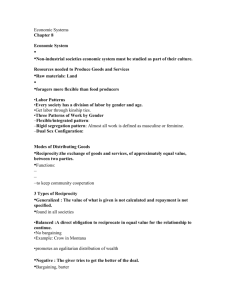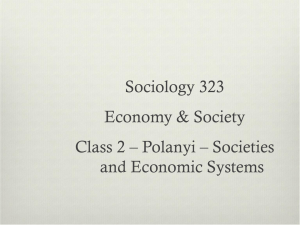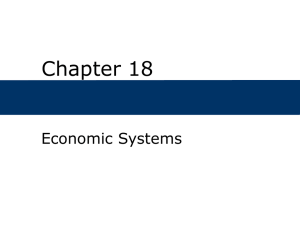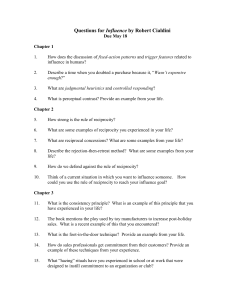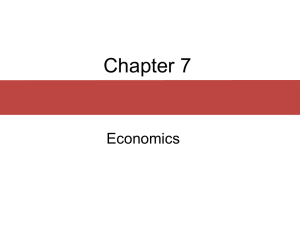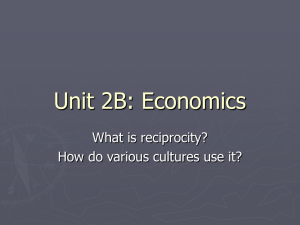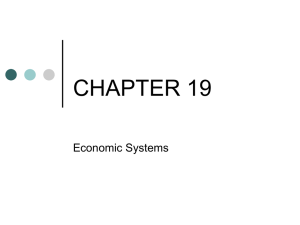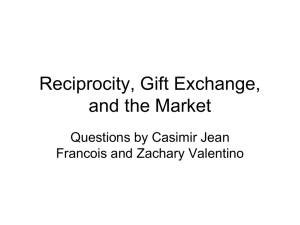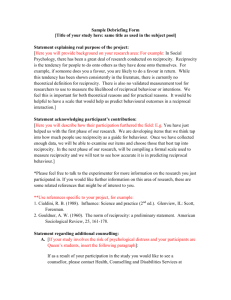Economics In Anthropology
advertisement
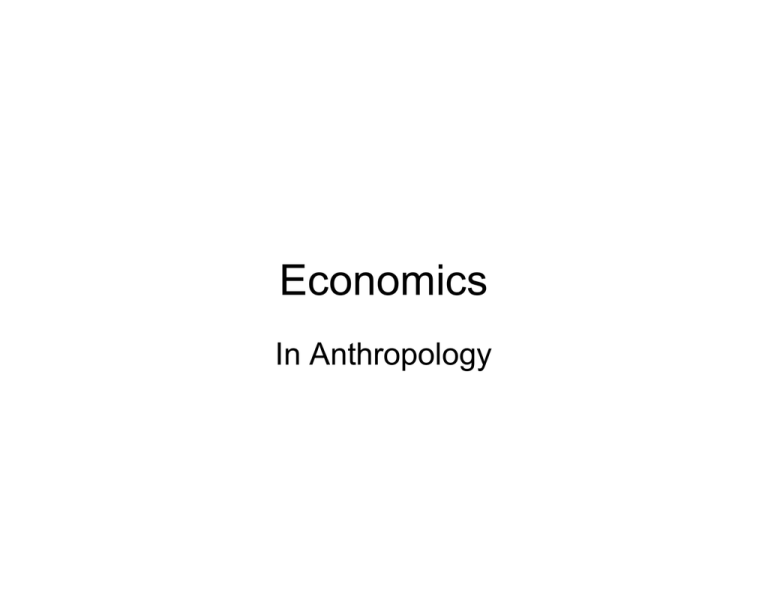
Economics In Anthropology Key Terms • • • • • • Economic System Balanced Reciprocity Capital Capitalism Firm Generalized Reciprocity • Household • • • • • • • • • Kula Ring Leveling Mechanism Negative Reciprocity Potlach Prestige Productive Resources Reciprocity Redistribution Surplus value of labor What “Economic” means in Anthropology • The study of ways in which the choices people make combine to determine how their society uses its scarce resources to produce and distribute goods and services Economics in Anthropology • Distribution, exchange and consumption of good are embedded in social political and economic relationships • Economic relationships: reciprocity, exchange, and consumerism Point # 1--Economics • Norms governing production, distribution and consumption of goods and services are within a society • Deals with the relationship of things to people and people to one another Production (Making a Living) • Way Production is organized has consequences for the family, kinship and descent and political organization Agriculture in Southern Mali • Children help farm when they are very young, thus tend to have many children • Large families can cultivate more land and therefore, are generally more wealthy than small families • Leaders acquire political and social prestige that is derived from having wealth and many relatives Point #2 • In non-industrial societies, production is carried out by groups such as families, larger kinship groups or local communities • Distribution, exchange and consumption of goods are embedded in social, political and economic relationships Marriage Celebration • Marriage celebration connects two families and builds networks of relations • Marriage is also a time for the exchange of culturally appropriate gifts. It is a form of balanced reciprocity Religious Feast Honduras • Community celebrates the feast of its patron saint. • Everybody in community contributes to the cost of the feat in culturally appropriate ways. • Usually one family is selected as the host of the feast. They accumulate expenses • Example of Redistribution Farmers Market • Guatemala • Local market for local peasants who sell surplus for money they need for items they require and for services including school fees for their children • Large Supermarkets like Wal-Mart are destroying local peasant based economies because they can sell things cheaper Distribution • • • • Reciprocity Redistribution Market Consumerism Reciprocity • General Reciprocity—Give more than you expect back. No immediate return. Parents and H&G • Balanced Reciprocity: expect back the value which you gave. Return is expected in reasonable time/ Example: U.S. birthday gifts • Negative: get back more than you give. General and Balanced Reciprocity maintain relationships while negative reciprocity ends relationships Family Celebration • Generalized Reciprocity • Mutual gift giving Bridal Shower Lunch • American Culture • Balanced Reciprocity • Cost of lunch averages out to gifts given to the soon to be bride Redistribution • A form of exchange in which goods ar collected feom or contributed by members of the group and then redistributed to the group often in the form of ceremonial feats • Potlatch—a form of competitive giveaway practiced by the Kwakiutl and other groups of the northwest coast of North America • U.S. Taxes Disaster Relief • American Culture • Disaster relief is example of redistribution. Goods—clothing and food are collected by center, for example, the American Red Cross and distributed to local community flood victims Purpose f Redistribution • In Tribal societies, it is a way of providing reserves to be used in times of shortage and was particularly necessary where food preservation techniques were not well developed Leveling Mechanism • A practice, value or form of social organization that evens out wealth in society • Ensures social goals along with economic ones • If an economy is based around redistribution, those who desire power and prestige will distribute as much wealth as they receive Capitalists • Owners of the means of productions, i.e., corporations, factories, plants, businesses • Buys worker labor by paying worker a wage • Wage is never equal to the cost of labor but it is what the market will support • Capitalist Primary goal: personal profit Market Exchange • An Economic system in which goods and services are bought and sold at a money price determined primarily by the forces of supply and demand • Principle distribution mechanism in most of the world’s societies today • It is impersonal and occurs without regard to the social position of the participant Economizing Behavior • Choosing a course of action that pursues the course of perceived maximal benefit • Equated “benefit” as a rational attempt to maximize profit, however this notion is very limited • Choices are based on some sort of calculation of benefit, whether it’s financial, social, leisure time, future benefit, family connections or tradition Which would you buy? • Need a pair of jeans? Would you buy the first slide (designer jeans at $158.00) or second pair (Sears jeans at $58.00) • Buy designer jeans due to peer pressure and to gain status • You really just need a pair of jeans • Every time you make a purchase, you contribute to the profit of somone else Culture and Choices • Culture, values and institutions provide the framework within which these choices are made • Capitalism dominates Western culture, thus, there is an extremely high value on wealth and material prosperity • Other societies, such as the Hadza of Tanzania are in business for their health and there is emphasis on leisure time Prestige as a Benefit of Economic Choice • Prestige—social honor or respect is another value toward which people may direct their energies • In Western societies, prestige is linked with increased consumption of goods and services • In other societies, prestige is associated with generosity and the giving of goods to another. In tribal societies, a poor man shames the rest of society.
